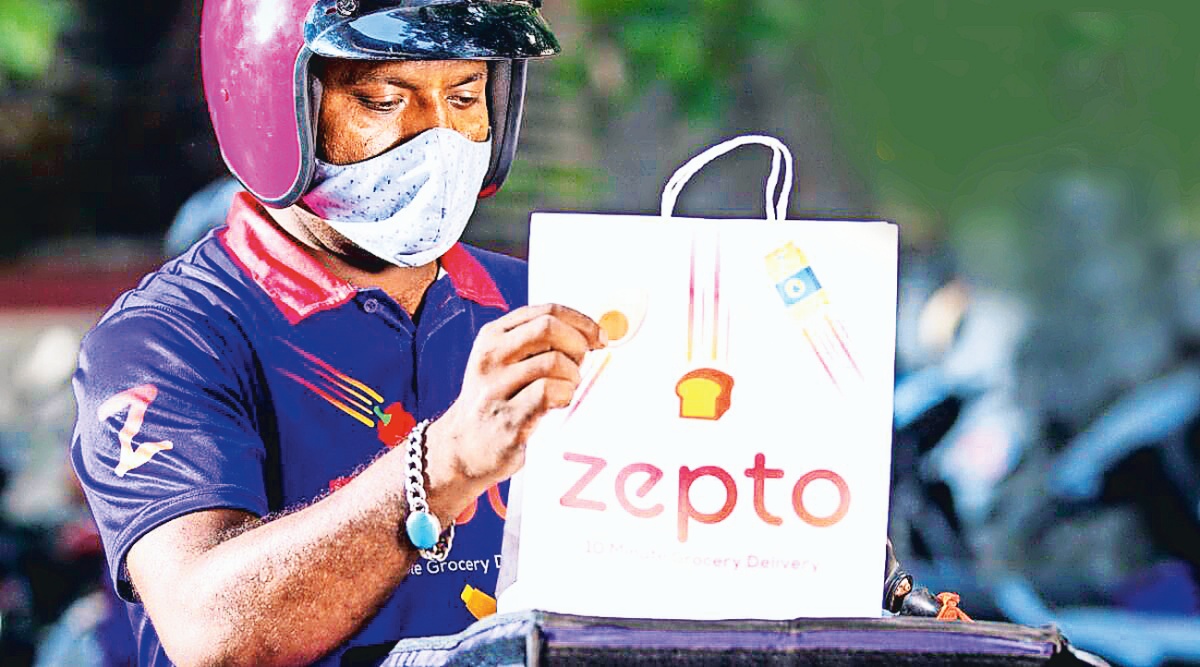 Riders for Zepto said that a failure to meet the deadline counts as a ‘breach’. File
Riders for Zepto said that a failure to meet the deadline counts as a ‘breach’. FileDespite growing concern around road safety as speed becomes the core focus of quick commerce startups, firms such as Blinkit and Zepto are learnt to have introduced new incentive-based payment terms that include penalising workers for late deliveries in some cases.
Delivery workers say the new terms are forcing them to ride even faster with orders, and making them more prone to breaking traffic rules, putting themselves and others on the road at risk.
Riders of Zepto, which promises to deliver groceries, fruit, ice cream, vegetables, milk, and snacks in 10 minutes, said that a failure to meet the deadline counts as a “breach” — and if they fail to deliver even after another five minutes have passed, it amounts to an “external breach” for which they are penalised by the company.
Also, the riders said, Zepto had in March cut their minimum weekly wage by 20 per cent. Earlier, the company paid them a guaranteed Rs 3,500 per week provided they remained logged into the app all seven days; this, the workers said, had been cut to Rs 2,800. “So if I decide to take leave on Saturday and Sunday, I do not get paid the weekly minimum guaranteed wage,” a Zepto delivery executive said, requesting anonymity.
Best of Express Premium
Zepto CEO and co-founder Aadit Palicha said not all late deliveries are penalised. Deductions are made only when delivery riders engage in “fraud”, he told The Sunday Express. Also, Palicha said, there is a helpline where workers can register their grievances if they believe deductions have been unfair.
According to Palicha, the minimum guarantee is helpful for riders who work at newer warehouses that do not typically see many orders in a day. “Once the stores start doing good orders, we default back to their (delivery riders’) regular rate cards,” he said.
Recently, a 19-year-old Zepto delivery staffer died after an unidentified vehicle hit his two-wheeler from the rear in Dwarka in northwest Delhi. Several stakeholders, including lawmakers and police, have repeatedly expressed concerns over traffic violations and safety as riders rush to meet unrealistic delivery deadlines.
Zepto’s main rival Blinkit has cut the per-delivery payment to workers from Rs 50 to Rs 25, and introduced an incentive-based payout structure similar to Zomato’s. According to the rider-side app that The Sunday Express accessed, Blinkit pays an incentive of Rs 100 for delivering 15 orders a day, and Rs 150 for delivering 32 orders a day.
Blinkit workers said their daily earnings are down by nearly 15-20 per cent, and they are now forced to deliver orders as quickly as possible in an attempt to achieve daily targets. “Under the old model, if I did 32 orders a day, I would make Rs 1,600, but under the new model, including the surge pricing during peak hours, I will make about Rs 1,350 for the same amount of work,” said a Blinkit worker who declined to be identified. The company did not respond to a detailed questionnaire sent by The Sunday Express.
A cash crunch has forced Blinkit to shut over 50 dark stores and lay off hundreds from its workforce in recent weeks. Zepto, meanwhile, closed a $200 million funding round earlier this month at a valuation of $900 million.
Platform firms like Zepto use third-party services to hire delivery workers. One of these providers is Zypp, which onboards riders for Zepto on a flat monthly remuneration of Rs 18,000, and also offers them an electric scooter. However, workers said that if they work even a day less than 28 days in a month, Zypp deducts Rs 3,000 from their monthly remuneration.
Two delivery workers at Blinkit and Zepto told The Sunday Express that their immediate supervisors resorted to verbal abuse if riders took more than 10 minutes to deliver an order. Palicha, however, claimed Zepto’s attrition rate was the lowest among all hyperlocal delivery services, and 7 per cent lower than its immediate competitor’s.
He also said that warehouse managers did not have visibility into individual orders. “If a rider’s order is flagged to be suspicious, then a manager is alerted who will have a conversation with the rider,” Palicha said.
During a special enforcement drive against delivery riders violating traffic rules, the Greater Chennai Traffic Police recently registered cases against almost 1,000 delivery executives working for platforms like Swiggy, Zomato, and Dunzo.
“We file cases against delivery workers who engage in traffic violations and intimate their respective companies about that. On the day we carried out the special enforcement drive…we registered close to 1,000 cases,” Kapil Kumar C Saratkar, Additional Commissioner of Police, Greater Chennai Traffic Police, told The Indian Express.
“To put that number in perspective, we filed a total of around 8,000 cases of traffic violations that day. We believe there are 9,000 such workers in Chennai, and if 1,000 of them are being booked for breaking traffic rules on a single day, that is a huge number,” Saratkar added.
- The Indian Express website has been rated GREEN for its credibility and trustworthiness by Newsguard, a global service that rates news sources for their journalistic standards.

